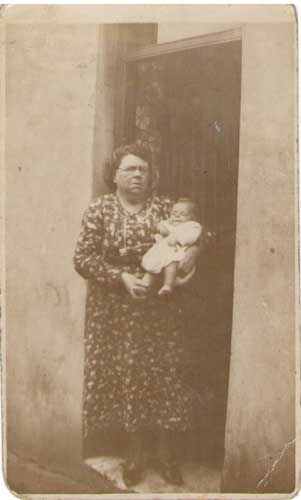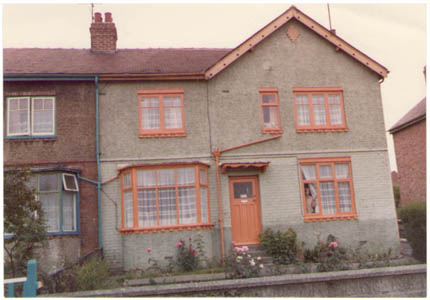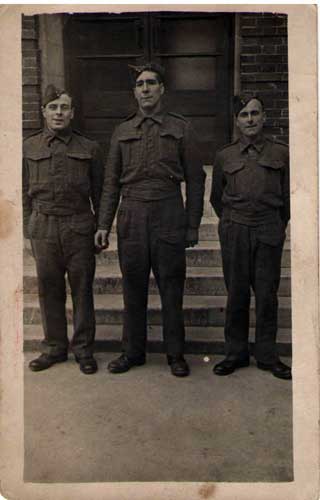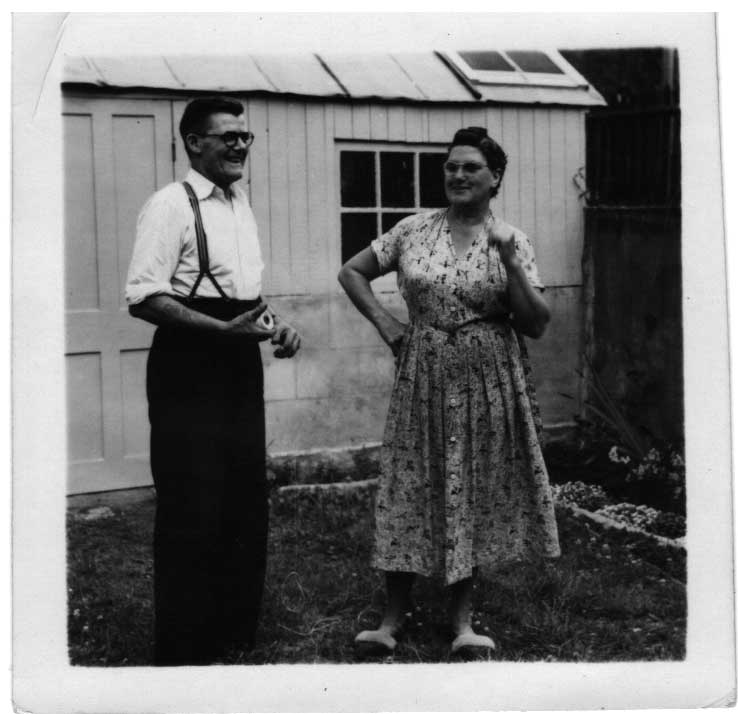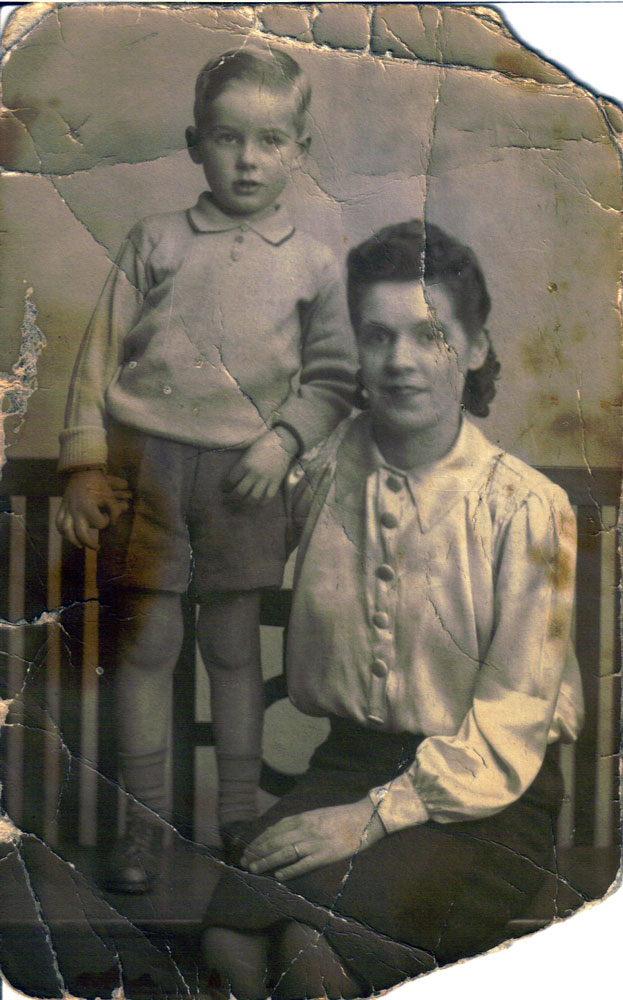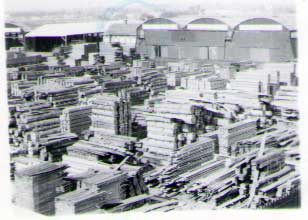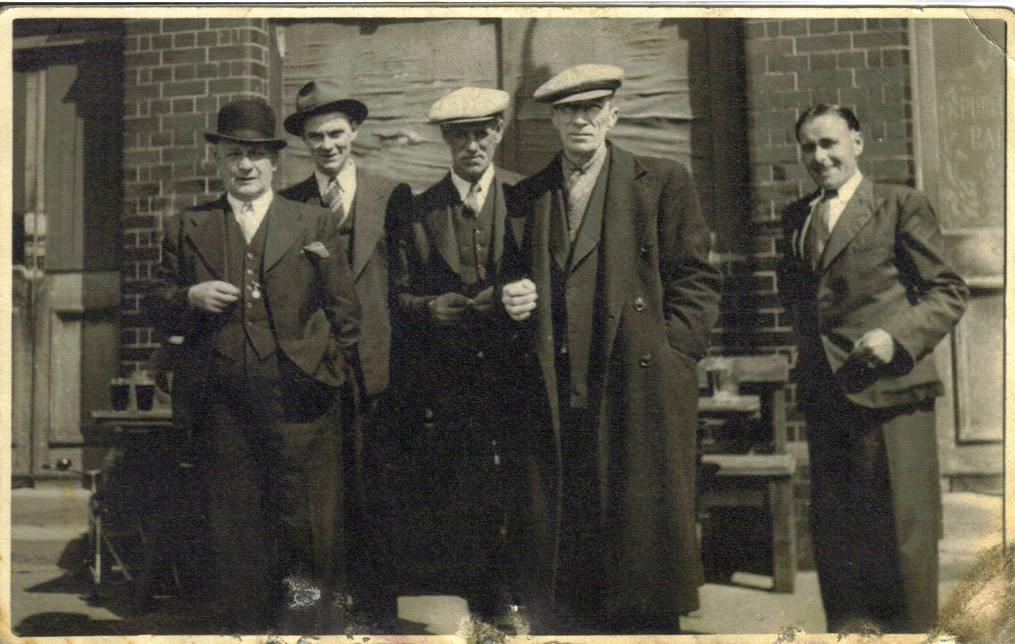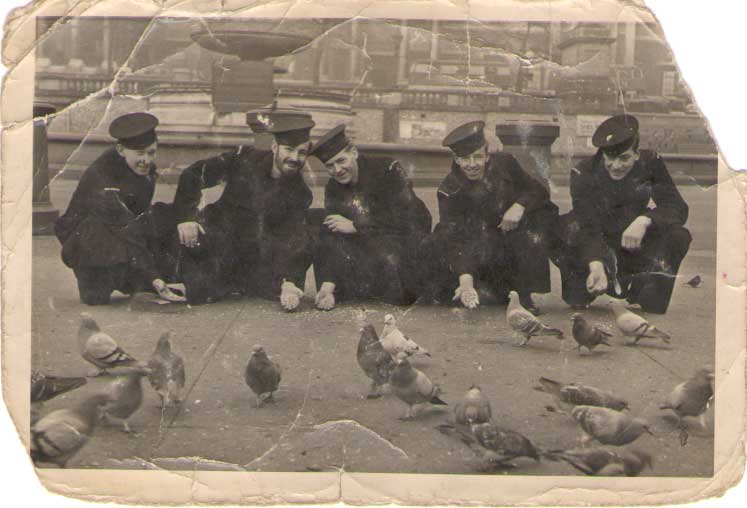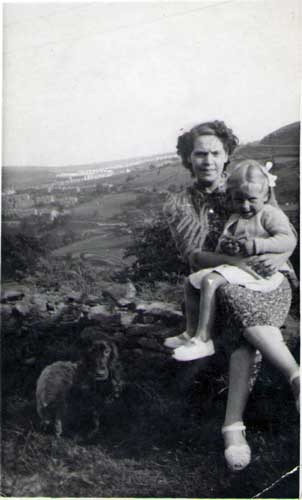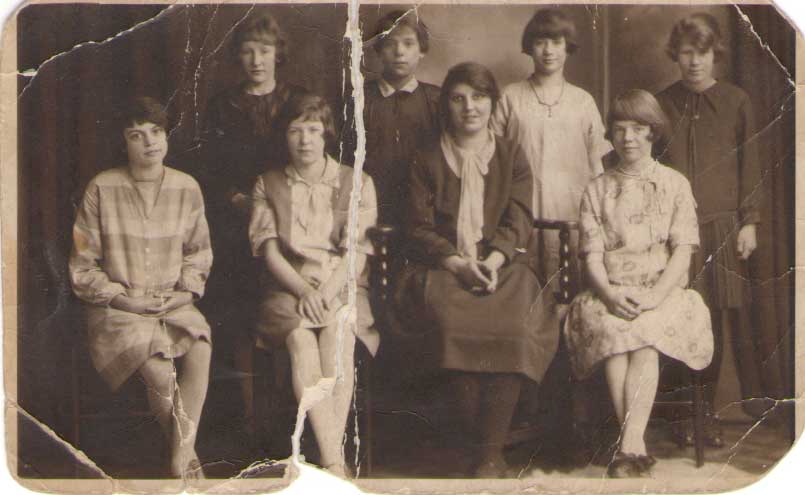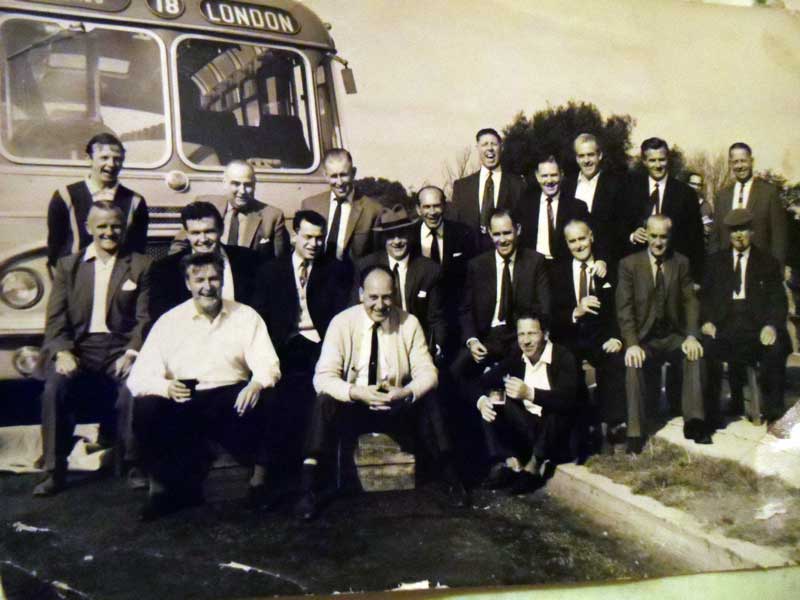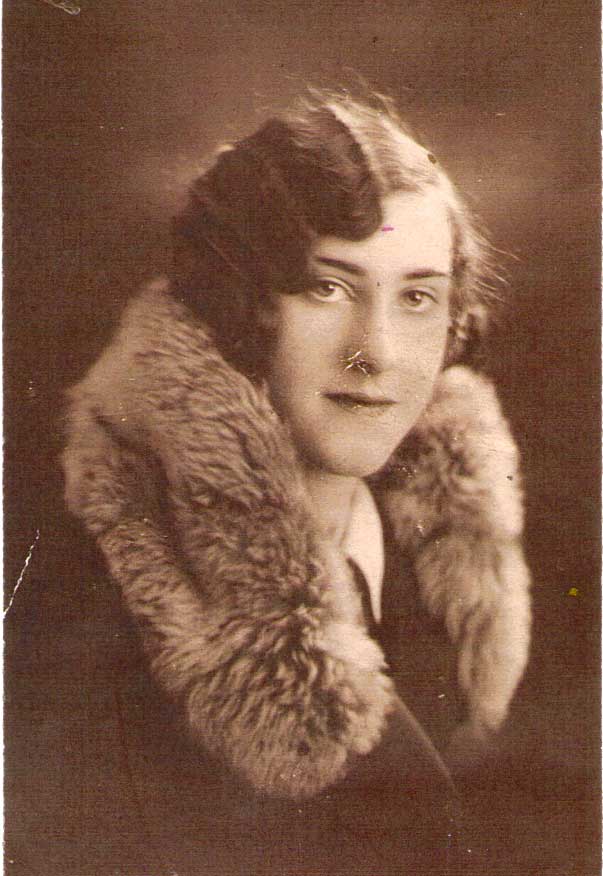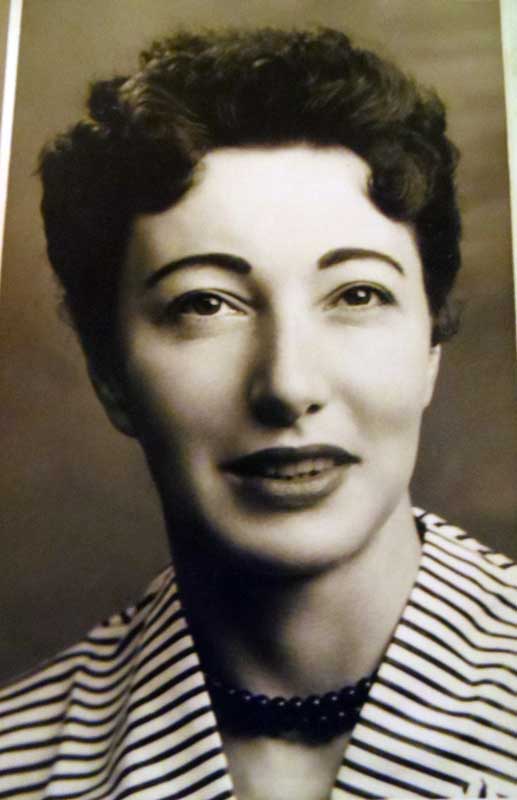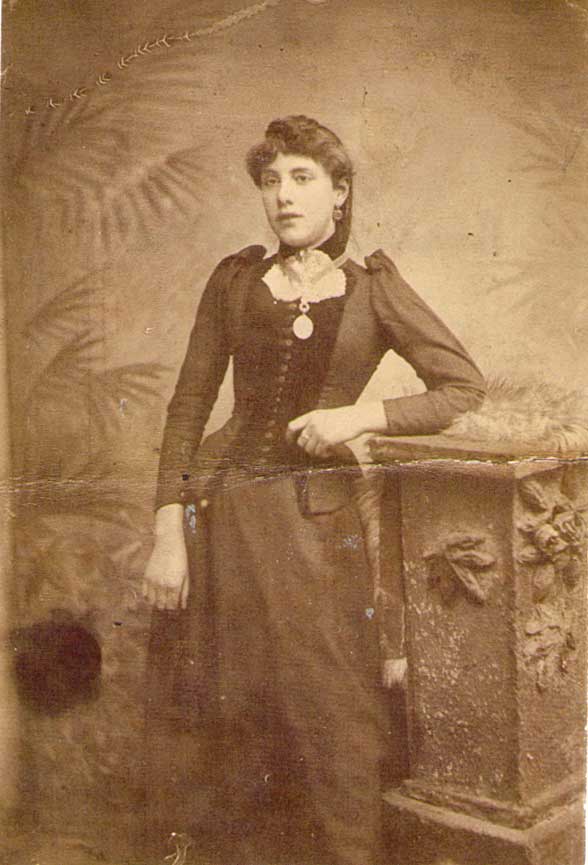|
Perhaps the most vivid memory of the bombing that I have is the night that James Latham’s wood yard was ignited by incendiary bombs. Our home and our shelter were within feet of the yard and because of the ferocity of the blaze we were evacuated from our Anderson to the large communal shelters that were built on Millfields. The image is still engraved into my memory. Someone, my Dad I think, carried me, wrapped in a blanket, as he ran to the shelter . Lots of people were also running, no panic, just a need to get away from the inferno. It must have been winter because there were no leaves on the trees so I could see the dark sky lit by hundreds of glowing wood embers, it might have been beautiful in other circumstances. There is a newsreel attached to this story, just click on it and a small bit of the wartime atmosphere will appear. On checking the date of this newsreel , I was amazed to see that I was barely two years old when this blaze occurred, yet my memory of it is so strong, not very detailed but vivid. The cause of the blaze is given in the newsreel as being ‘a spark from a train’. This I believe is a bit of wartime propaganda, the reason was an incendiary bomb raid, the more gentle explanation was given to keep people’s morale up. |
The scariest incident that happened to me was again during the day, Mum was at work in the factory and I was in the care of my dear Aunt Rose. It was a nice sunny day and we were playing around the council shelters, some women, including Aunt Rose were preparing dinner on a table near the shelter entrance when the air raid warning sounded. Us kids were immediately sent to the bowels of the shelter but the women stayed at their posts diligently peeling the spuds.
My Old Man
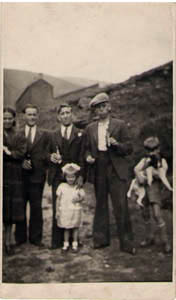 So far in these tales there has not been
much mention of my Dad, that’s because while all these events were unfolding he
was away in the army, but don’t worry, there are lots of stories to tell about
him.
So far in these tales there has not been
much mention of my Dad, that’s because while all these events were unfolding he
was away in the army, but don’t worry, there are lots of stories to tell about
him.
While he was serving King and Country me and Mum had to look after the chickens and rabbits we bred in the back garden. I gathered the eggs daily and collected kitchen scraps from neighbours. I also loved looking after the chicks, so when it was my birthday Mum took me to Walthamstow Market on the train and bought me a day old duckling. Not having much of an imagination I called it ‘Donald’ No-one expected Donald to survive but with my constant attention and with a bath sunk into the earth for a pond, he grew into the most handsome white duck. I had ever seen, I was so proud of him! Now this is where my Dad comes into the story, he had a weekend pass and arrived home in Hackney absolutely boracic lint. On seeing dear Donald, he wrung his neck and raffled him in the pub to procure some pocket money. Of course Mum and Dad told me that Donald had gone to a lovely farm in the country to be safe from the bombing. You know what, I believed them!
This next story was passed down to me by
various members of my Dad’s drinking fellowship, so it must be true. Before he
was called up and in the early stage of the war, a bomb on a parachute landed
on the large block of flats across the road from us. The bomb got stuck on a
chimney and failed to go off, the bomb disposal unit was called but could not
come for some time. In the meantime the Air Raid wardens were evacuating the
bloc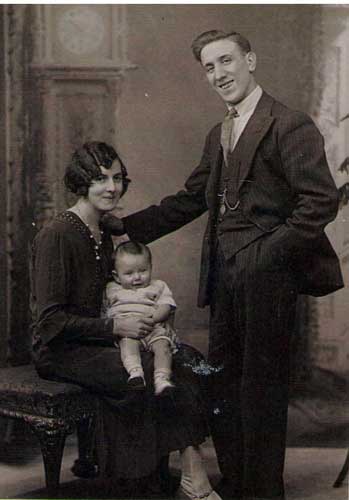 k. In the block lived a number of housebound people, who were very distressed. Now my dad was a builder well used to climbing on roofs and chimneys, and you’ve guessed it, fortified by copious amounts of Mann’s beer and gee-ed on by his equally fortified mates he swung into action.
k. In the block lived a number of housebound people, who were very distressed. Now my dad was a builder well used to climbing on roofs and chimneys, and you’ve guessed it, fortified by copious amounts of Mann’s beer and gee-ed on by his equally fortified mates he swung into action.
Somehow he arrived back on terra firma with the bomb on his shoulder and a smile on his face. After the bomb squad arrived and remonstrated with my Dad, I assume he joined his cronies to continue getting fortified
When I was a kid, children were not allowed in pubs, so most people of my age will tell you that they had to sit outside with a glass of Lemonade and an Arrowroot biscuit. My Dad, home on leave, went for a Sunday morning drink with his mates to the King’s Head on Middlesex Wharf. Of course I went with him while Mum was making Sunday dinner. I was duly supplied with the regulation drink and rock hard biscuit and placed on a splintery bench outside the pub. Now Middlesex Wharf was right in the middle of James Latham’s timber yard and quite remote, so I was pretty lonely. Soon things livened up a bit when the air raid warning sounded, I never did anything but the drinkers inside gave a rousing cheer, no doubt they were drinking more than lemonade. Before too long ‘planes appeared in the sky which prompted even more cheering from the interior. At this point Mr. Sandell, a Victorian gent complete with large flat cap and white walrus moustache, came out of the door and saw my plight. Then something magical happened, He took me into the pub. I walked into the dark public bar ( the windows were boarded up) and was struck at once by the smell of Woodbines and Beer, I was I was fascinated, I was in some mystical forbidden land. Mr. Sandell took me to my Dad and rather embarrassed, my Dad confessed he had forgotten that I was outside. We could hear an increase in activity in the air, more cheering this time accompanied by swearing, and when distant explosions were heard, the air turned blue with bad language. The words German and Bastards were prevalent. I had a marvelous time and couldn’t wait to tell my Mum when I got home, but unfortunately I included the part about Dad forgetting me. This was a cue for another display of the award winning Welsh temper. Poor old Dad was in the doghouse for the rest of his leave.
What I Am Today
 All during the war when my Dad was away, my
Mum worked in a local furniture factory. The furniture had been forsaken and
replaced by the making of ammunition boxes, Mum operated a bench saw cutting
logs into planks, a grueling job for anyone let alone a very young woman. As
well as this she kept our home immaculate and stylish and cooked the most tasty
of food. I was always dressed smartly with polished shoes, socks pulled up and
a collar and tie. On one particular day I had on a blazer, all these articles
of clothing of course were second hand. At Detmold Road School we had a teacher
called Mr. Hunter, a superior man with a sneer on his face. He spotted the
blazer and called me to the front of the class, the blazer had an embroidered
badge on the pocket. I can recall it in detail, it was a Stag’s Head with a
ribbon below it, in the ribbon was a Latin inscription. Hunter questioned me
about the blazer and forced me to reveal that it came from a junk shop. He then
asked me for a translation of the Latin motto which of course I could not give.
He ridiculed me for my ignorance in front of the whole class, and then he
spotted that I had a shirt button loose. The sneer became more intense and my
embarrassment overwhelmed me, I felt my face burning and my heart thumping, I
wanted to disappear through the floor. “You are a disgrace “he said menacingly
“is your Mother too lazy to sew on a button?” My Mum lazy? I just wanted my Mum
to appear through the door complete with her Welsh temper, but alas, this
‘lazy’ woman was too busy toiling like a man in her effort to win the war. This
is when Hunter’s face distorted and he grabbed me by the scruff of the neck and
shouted the words that were to haunt me for the rest of my life “Look at you, I
despise you and the likes of you, you are nothing but AN EAST END
GUTTERSNIPE!!!! I suppose that I should thank the fiend for making me what I am today… a
stroppy left wing anti establishment bloke with a massive working class chip on
my shoulder. Yes, I am an east end guttersnipe…and proud of it!!
All during the war when my Dad was away, my
Mum worked in a local furniture factory. The furniture had been forsaken and
replaced by the making of ammunition boxes, Mum operated a bench saw cutting
logs into planks, a grueling job for anyone let alone a very young woman. As
well as this she kept our home immaculate and stylish and cooked the most tasty
of food. I was always dressed smartly with polished shoes, socks pulled up and
a collar and tie. On one particular day I had on a blazer, all these articles
of clothing of course were second hand. At Detmold Road School we had a teacher
called Mr. Hunter, a superior man with a sneer on his face. He spotted the
blazer and called me to the front of the class, the blazer had an embroidered
badge on the pocket. I can recall it in detail, it was a Stag’s Head with a
ribbon below it, in the ribbon was a Latin inscription. Hunter questioned me
about the blazer and forced me to reveal that it came from a junk shop. He then
asked me for a translation of the Latin motto which of course I could not give.
He ridiculed me for my ignorance in front of the whole class, and then he
spotted that I had a shirt button loose. The sneer became more intense and my
embarrassment overwhelmed me, I felt my face burning and my heart thumping, I
wanted to disappear through the floor. “You are a disgrace “he said menacingly
“is your Mother too lazy to sew on a button?” My Mum lazy? I just wanted my Mum
to appear through the door complete with her Welsh temper, but alas, this
‘lazy’ woman was too busy toiling like a man in her effort to win the war. This
is when Hunter’s face distorted and he grabbed me by the scruff of the neck and
shouted the words that were to haunt me for the rest of my life “Look at you, I
despise you and the likes of you, you are nothing but AN EAST END
GUTTERSNIPE!!!! I suppose that I should thank the fiend for making me what I am today… a
stroppy left wing anti establishment bloke with a massive working class chip on
my shoulder. Yes, I am an east end guttersnipe…and proud of it!!
Perhaps I should file Hunter in the same folder as Maggie Thatcher, I’m sure they would get on fine together.
Most of the teachers at Detmold Road were not as evil as Hunter, for the most part they were caring and kind, more importantly they were good at giving us a proper education. However, the system of punishment was open to abuse. We often hear people today saying we should bring back corporal punishment and that a clip round the ear never did them any harm, well I don’t think so. Nearly every teacher had their own way of dishing out punishment that today seems so barbaric. One had a thick wooden ruler that was whacked sharply across your knuckles. We were ordered to let our hands dangle loosely to maximise the pain, then the ruler was brought down with the sharp edge doing the damage. The hand was unusable for 20 or so minutes afterwards. Another had a ‘collybosher’, a two foot length of broom handle painted in gaudy stripes, this was handy for hitting you on the head, shoulders or across your back. Sometimes offenders would ‘get the slipper’, a cosy name for an extremely painful experience. Then there was the dreaded Cane, the threat of which put fear into the hearts of everyone. For those of you who say all this was harmless , read on. It seemed that the mildest of teachers liked to inflict pain and put such enthusiasm into this wicked duty. Six of the best across the hand or the bum was usual, resulting in pupils crying in pain, all this in full view of the rest of the class. One teacher who was short, would stand on a piano stool and leap off as he whacked, this was in order intensify the agony, some times some of the class would cry in sympathy for the unfortunate recipient of this torture. We had one classmate, Tommy Cornish, who was big for his age, and to be honest, a bit of a handful, who was punished the most severely. Tommy would not let anyone get the better of him and definitely would not cry, he paid dearly for this. He was due to be caned and Shortarse prepared the piano stool, and performed his athletic leap no less than six times, each time striking Tommy’s hand. Tommy fighting not to show the pain, bit his lip, stuck out his chin, looked the sadist in the eye and defiantly said “Didn’t Hurt!” What happened next shocked the whole class and even some of the staff, the midget masochist went berserk, told Tommy to roll up his sleeves and proceeded to slash wildly with the cane up and down Tommy’s arms. To Tommy’s credit he never showed any pain but just stared at teacher with hatred and anger. When the punishment was over, Tommy’s arms were bruised and bleeding, and he had a look of hatred on his face.. The class was silent, someone sent for the headmaster and we were dismissed. Next day Tommy’s Dad came to the School and saw the head master but nothing ever happened about it. Tommy was never bothered again!
Don’t forget, we were not teenage hooligans but seven year old kids confused by the turmoil that surrounded us.
I don’t want to give the impression that Detmold Road School was a hell on earth, far from it, we had some memorable teachers. Mr. Jones, who played piano and encouraged us to sing, and Miss Lochspeiser who’s brother was Knighted for services to aeronautics. She would recount her visit to ‘The Palace’ and her meeting with the King, over and over again, Mr. Cartwright, the headmaster who’s answer to all the problems of the world was National Savings, and was always supportive of promising pupils, and the favourite person, loved by everyone, Mrs. Cook, not a teacher but a kitchen assistant. Mrs. Cook was a small cockney lady who spoke like Katherine Harrison and dispensed our daily dose of Malt Extract from a huge tin. The sticky dark brown gunge was twisted onto a spoon and carefully placed into our mouths by the angelic Mrs. Cook. I’m smiling broadly as I write this!
Tommy Cornish remained my mate throughout our childhood. He continued to grow faster than any of us and never lost his ability to be daring and shocking. If there was a building that was impossible to climb or a bully that everyone was scared of, Tommy just faced the dangers without a sign of fear or concern, he could be seen swinging from gutters three storeys up, shinning up drainpipes and into windows or up in the branches of the tallest trees, always with a big soppy grin on his face. More than once he came unstuck inflicting horrific injuries upon himself, he spent weeks at a time in hospital coming home with bolts in his limbs and a steel plate in his head. Nothing curbed his love of peril or his ability to aggravate, just for the fun of it. I can remember my Mum chasing him with a coal shovel in her hand after he had teased her mercilessly. Tommy of course, was laughing uncontrollably, I have often wondered what would have happened if the Welsh temper had caught up with him. Something in him would not be tamed, once when we were in a queue for local fleapit, an assistant told Tommy to stop blocking the pathway, Tommy just laughed so the unfortunate individual pushed him against the wall. What an mistake to make, Tommy’s arm snaked round his neck and within a split second the cocky bloke was on his back with Tommy’s foot on his chest. This seemed to be his ‘Piece de resistance’, performing it on a few adversaries and even one of his teachers, but one night in Walthamstow he bit off more than he could chew. A disagreement with a policeman soon saw the copper on his back with Tommy’s size ten on his rib cage. Tommy was taken away by the lawmen. When he was eventually allowed home, neighbours wept to see the unrecognisable state of him.
I last saw Tommy when I was about 21, he was still grinning while he towered above me. Later I read in the local paper that he was sentenced to a substantial time in prison. What did he do? Well, he just opened a couple of safes with the help of gelignite. Still fearless, still daring and still shocking people to the last. I don’t know where he is now, but I do hope he is OK.
A Surprise Visit
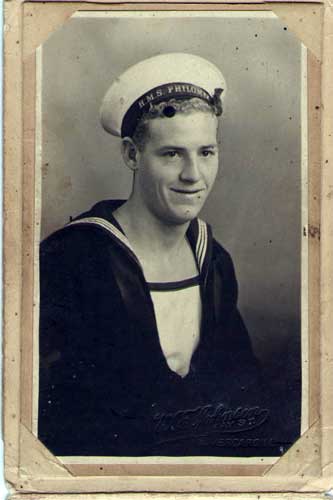 My Mum was from a large family, among this
family were two sisters who in the 1920s along with their families, had left
the poverty of Wales and settled in the impossibly far off New Zealand. Cards
were exchanged at Christmas, but mainly contact was nonexistent. However, war
changes things drastically and throws up some strange bedfellows-- literally! We lived in a small three-roomed flat and I slept in the front room in a folding
bed, known in those days as a Put-U-Up. Because I was small the bed seemed
huge, but I was soon to find out how small it was. One morning I woke early
feeling strangely uncomfortable, little wonder, sharing my bed with me was a
Kiwi cousin, Ken, along with four of his shipmates from the New Zealand Navy,
one complete with a full naval beard. It seems they had arrived after my
bedtime and just snuggled into the only berth available. Ken was unknown to me
and certainly his shipmates were, but we all got on like wildfire. They only
stayed a day or two and that was the only time we ever met Ken.
My Mum was from a large family, among this
family were two sisters who in the 1920s along with their families, had left
the poverty of Wales and settled in the impossibly far off New Zealand. Cards
were exchanged at Christmas, but mainly contact was nonexistent. However, war
changes things drastically and throws up some strange bedfellows-- literally! We lived in a small three-roomed flat and I slept in the front room in a folding
bed, known in those days as a Put-U-Up. Because I was small the bed seemed
huge, but I was soon to find out how small it was. One morning I woke early
feeling strangely uncomfortable, little wonder, sharing my bed with me was a
Kiwi cousin, Ken, along with four of his shipmates from the New Zealand Navy,
one complete with a full naval beard. It seems they had arrived after my
bedtime and just snuggled into the only berth available. Ken was unknown to me
and certainly his shipmates were, but we all got on like wildfire. They only
stayed a day or two and that was the only time we ever met Ken.
During their short stay an historic event occurred. This was near the end of the war and Hitler’s weapons had progressed. The V2 rocket had superseded the doodlebug, it was a jet propelled rocket that space rockets were to be based on, and flew faster than sound. As a result of this speed the sound of its motors could not be heard until after it had delivered it’s deadly load, quite a frightening shock for Londoners
My Mum in a gesture to please the commonwealth had decided to cook a meal for all 5 members of the New Zealand Navy. As she busied herself in the tiny scullery, she called to Ken to take some plates out of the cupboard and as he opened the door an almighty crash was heard. Mum was about to call Ken all sorts of clumsy so-and-so’s when she realised that it was a V2 rocket that had fallen close by. Two windows caved in , the front door flew open, splintering the frame. One of the sailors grabbed me and threw me under the solid table for protection. Unfortunately his aim was poor and I cracked my head on the table leg causing a beauty of a bruise. It seems that the New Zealand Navy had inflicted more damage on me than the dreaded Luftwaffe.
The V2 had landed on the marshes near to the wood yard, the wall of the wood yard and the cranes were caked with mud, and tiles and chimney-pots showered the area. My cousin Charlie, one of the more successful Shrapnel collectors, immediately visited the site and was rewarded with a bright shiny, still warm dial, complete with writing in Teutonic script. To this day there is a ‘Bomb Crater Pond’ on the marshes.
I have mentioned James Latham’s wood yard quite a lot, that is because it was such a big part of our lives. Our flat was only yards from this huge firm, and its cranes and wood stacks dominated the area. It was very important for the war effort and when the despicable ‘Lord Haw Haw’ mentioned it in one of his broadcasts from Germany, threatening to blow it to kingdom come, we were quite proud. I dare say I will mention it a few more times.
VE Day
Of course I remember VE day, but not in too much detail. I recall the huge bonfire built in the middle of the road, burning a large hole in the tarmac, and a piano being wheeled out into the road along with wooden barrels of beer. On top of the flat roof of the concrete shelters people danced, and many just sat outside their front doors enjoying the celebrations. No doubt they were so pleased to be celebrating peace at last.
Us kids didn’t quite grasp the enormity of this historic occasion so set about building our own small bonfire in the gutter. Into this fire we casually tossed a dozen or so ‘Taters, but not having the benefit of instructions from the likes of Jamie Oliver and co. we just left them to their own devices in the glowing embers. When we eventually decide to rescue them we had trouble distinguishing them from the lumps of charcoal that our kindling had turned into. They were burned beyond recognition but that did not stop us from wanting to sink our teeth into these ‘delicacies’. After tossing them in the air from hand to hand in an effort to make them comfortable to hold we attempted to get to the delicious soft centre of the spud. Well as you can guess there wasn’t much of this left, but that never stopped us from sucking at the burnt offerings with relish resulting in us having soot all over our faces and hands and most of our clothes.
Tilly of the Valley
 My Mum was
born on 12th January 1914 in the little village of Cymmer in the
Afan valley, South Wales. She was christened Agnes Matilda but absolutely hated
both her names. Agnes was immediately ditched and Matilda shortened to ‘Tilly’.
My Mum was
born on 12th January 1914 in the little village of Cymmer in the
Afan valley, South Wales. She was christened Agnes Matilda but absolutely hated
both her names. Agnes was immediately ditched and Matilda shortened to ‘Tilly’.
Her Dad and 5 brothers were miners and with her Mum and 3 sisters lived in one small house. Money was tight and conditions rather harsh. Mining was dangerous and medical help was primitive. There were no ambulances, if a miner was injured, his workmates carried him down the valley on a ladder, delivering him to his front door. Miners suffered injuries, small and large, pretty frequently, and when Uncle Will had his foot run over by a ‘dram’, a coal wagon on a railway, he was operated on on the kitchen table. Uncle Will lost a few toes and my Mum, just a little girl, cleaned up the gore that remained on the floor. Her Dad was severely injured in an accident in the pit and just sat in the kitchen for years until he was found dead one morning Nearly all of her brothers went on to suffer unspeakable injuries. Not an ideal childhood! For most of her life she was given to bouts of depression, no wonder!
When she was 14 she made a brave decision and came to London to work in service, it couldn’t have been an easy decision to make . She worked for a Jewish family in Stamford Hill and I believe she was happy there. She learned about the Jewish faith and culture and even picked up a few Hebrew and Yiddish words. Mum never judged anyone by what they were, I think the influence of this family made her that way.
She met my Dad and fell for him and his large family and it seemed that the large family fell for her, not to mention my Dad of course. They married. I was born, and after the war my sister was born and they remained married for 56 years.
When I was young, Mum was my saviour and protector, my source of comfort when I was scared, and I was always sure of her love for me when every night she would tuck me up in bed, kiss me and say ‘Nos Da Bachan’, Welsh for Goodnight Darling. However I was not always safe from the Welsh temper and I can recall vividly the time when I was at my most irritating, singing and ‘tap-dancing’ while she was listening for signs of enemy action. As she unpacked our meagre rations, she reached the end of her patience and a pound of precious sugar made it’s way in the direction of my head. Luckily her aim was affected by her anger and she missed by a mile, unfortunately the contents of the paper bag spread all over the front room floor, causing us both to fall about laughing. The front room floor ‘crunched’ for days afterwards
She was forever singing and had wonderful sense of fun but was burdened by her very sensitive nature, a harmless bit of mickey taking would cut her to the quick and upset her for hours, perhaps this was a reason for her temper, who knows?
Her sense of right and wrong was strong and she couldn’t stand bullies. One instance of her support of the underdog was when I was with her on a bus in Hackney. It was the very early 50s and black people began to appear in Hackney. A young black couple got on the bus and sat down, they were only about 17 or 18 and rather timid. The bus conductor made a derogatory remark to them and threw the ticket at them. I felt my Mum’s body stiffen, the conductor, every time he passed the couple, made another nasty remark and gave them a shove with his elbow. Cue for the entrance of the Red Dragon, Mum stamped to her feet and shouted to the miserable excuse for a man “Leave them alone you Bloody bully” “Mind your own business “he replied, “Pick on someone your own size” replied Mum. “Why don’t you pick on me? Come on get off this bus and I’ll knock your bloody head off, you coward,” and so the challenge and threats continued until we stepped off of the bus, Mum waited for the twerp to pick up the gauntlet. Pick up the gauntlet? You must be joking, he sounded the bell and the bus flew off down the road leaving us on the pavement with only half of our journey complete . Never mind I swelled with pride and Mum continued to threaten him all the way home despite the fact that he was nowhere to be seen.
You see, in the village of Cymmer there
were a few Black families, who had been there for generations, their
predecessors 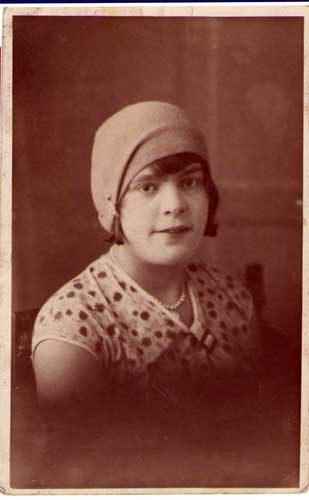 coming to Wales in the Victorian age to find work in the mines.
Mum had been brought up with them being particularly close to one of the girls,
she had only ever thought of them as being Welsh.
coming to Wales in the Victorian age to find work in the mines.
Mum had been brought up with them being particularly close to one of the girls,
she had only ever thought of them as being Welsh.
Even into old age her sense of fair play and outrage never waned. When she was well into her 80s and quite limited physically my sister Eira took her to Roman Road market, she shuffled through the busy market holding firmly onto Eira’s arm when two blokes started fighting, it was proper fisticuffs with hard punches being dealt out. One bloke went down and the other kept punching him as he tried to get up, this did not please my mum and it had the effect of prodding the now ancient Welsh temper, back into action. The shoppers were pushed aside as Supergran dived into action pushing the dominant hardman in the chest and shouting at him to “Pack it up and behave yourself”. Strangely he stopped and stood there while mum gave him an earful that he would never forget!
She was a good looking, outgoing, happy woman, who loved to sing. She cared about other people, if any of the family or neighbours were ill she would look after them. I well remember her boiling up Kaolin Poultice to treat boils or infected wounds and applying the piping hot concoction to the affected area. The ‘victims’ of this remedy would be, to say the least, agitated, but my Mum would soothe them with her lilting Welsh voice, she was a bit special! Throughout her life she was visited by dark depression and in such times could be difficult, my Dad, my sister Eira and me bore the brunt of her anger at being so ill, and when things got bad she would declare “I’ve had enough, I’m going home!”. Home was of course Cymmer, but there was not the slimmest chance of her return. As I have mentioned she was very sensitive and if she read in the paper that miners had been killed, no matter if it was in China, Australia or some unheard of corner of the world, she would shed a tear for them. No doubt her own family were in her mind.
Send for Sid
Sid was our Dad. He was also ‘Our Siddy ‘ to his many sisters and Uncle Sid to the throng of nieces and nephews that congregated around our enclave. He was adored by all who knew him, and there is no doubt at all that he loved them in return. Never one to speak of his feelings, he showed his affections by giving his family his attention. Every Sunday morning he would visit each of his sisters on a rambling walk that finished up in the King’s Head, he did this for as long as I can remember.
Hackney born and bred he was an old fashioned cockney, using the Rhyming Slang whenever he spoke. He loved telling jokes, even if they were the same jokes over and over again much to the annoyance of my Mum. I sometimes find myself telling his jokes. For example, if any one asked him how he was, he would say “I’m very weak, I’m so weak I’m nearly a fortnight!” When asked what was the matter with him, he would reply every time “I’m suffering from a severe attack of Weasels on the Nanny! “He would jokingly liken people to his own fictitious characters, characters such as Trotter Flo, Nutcase O’Leary, Trapper Dan, Little Dolly Gotmuch and even Big Chief Rippincollar. His humour was endless even when he was ill, once when he was in his late 70s and suffered an attack, I took him to A&E and he was seen by a doctor. When I asked him what the doctor had said to him, he said, with a perfectly straight face”It’s bad news… I’ve got to stop playing football”
The doctor decided that he should stay in hospital for observation and he was sent to the entry ward. It was the early hours of the morning and the ward was dark and forbidding, there were only two other patients, one was an obvious alcoholic who was ‘groaning’ Irish songs in the most distressing of manners. The other was a man with some kind of mental problem and was calling for help in an equally distressing manner. When it was time for me to leave I had trepidations and said “I don’t like to leave you, Dad” he replied with the same straight face “Don’t worry. I’ve got plenty of company…… I’ve got him over there, and him over there”.
He loved to tell stories of when he was a boy and the family lived on the Wharf. They were extremely poor and his Mum would go to the market and buy scrap foodstuff such as Cod’s Heads and Bacon Bones, of course he made a joke about this. I heard all these stories many times and cherish them, They remind me of him. If he had an audience he was in his element running through these stories with gusto, animating them with swinging hand movements, standing up suddenly and sitting down firmly to add emphasis to his words. These stories became known as ‘Tales of the Old Iron Pot’
Far from being rough and ready, he was an old fashioned gentleman, never using bad language in the home or in front of a woman and he would never mention anything below the belt, it wasn’t done in his day.
He worked as a builder and could do anything in the trade, bricklaying, plumbing, carpentry and so much more. He specialised in drain laying and when architects needed practical advice they would ‘Send for Sid’, this soon became his nickname. In spite of his obvious mastery of building he would describe himself as ‘a handyman’. I told him many times to up his rank to ‘Master Builder’ but I was just given a shrug of his shoulders.
One story he loved to tell was when he was working in a Mental Hospital in Brookman’s Park. The hospital had many long term patients who wandered the grounds. Dad, and his labourer, young Tommy were laying drains alongside the main driveway to the hospital. When visitors began to arrive, Dad stopped one lady and asked her the time, the reply was “Don’t worry dear, it will soon be time for your tea”. Dad and young Tommy fell into the trench helpless with laughter.
As well as his building skills, he was a brilliant gardener, keeping our small back garden a sight to behold, and when one of his sisters popped in they always left with a bunch of freshly cut flowers. Some of the gardening lessons he gave me when I was very young included a lot of his silly humour. We were sowing potatoes once when he told me that he needed a packet of razor blades, “What for?“I asked, “Well“he replied, “If we dig the blades in with the ’taters, next year we will have a good crop of Chips”. Another time he buried a hand brush so that only the bristles showed and told me it was an Australian Brush Plant. I watered it for a week before I tumbled. He Joined the ‘Kings Head’ darts team as a young man and stayed into his late 70s, as time went by his team mates got old and stopped playing, younger men taking their places but Dad kept his arrows straight and played on. While the average age of the players was about 30, Dad was still ’one of the boys’, respected and loved by the rest of the team.
I never heard him raise his voice in anger or to chastise us at all, if there was ever any dispute or disagreement with anyone he wouldn’t get upset…he just sent my Mum, she soon sorted them out!
When I was 11 years old, I was walking along Whitechapel Road to Mile End Gate, on the corner of Sidney Street, just opposite the now notorious Blind Beggar pub, was ‘Smithsons’ paint factory. I heard someone calling me, looking up I saw my Dad on the roof of the factory, he was obviously pleased to see me and waved his arms back and forwards. It was good to see him. The paint factory has gone now, in its place is a Barclay’s Bank, but even now, whenever I pass this corner I look up hoping to see him. I live in hope!
Better Times
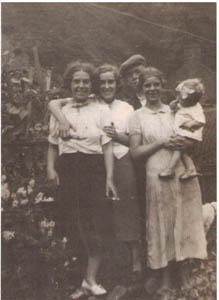 The war over, troops began to return home,
some things came off of rations, the bomb damage was being cleared up and a
feeling of hope was about. Dad came home and got his old job back and Mr. and
Mrs. Day became closer to us (if that was possible). The ever resourceful Mr. Day built the height of luxury, a bathroom.
Well when I say, bathroom it was more of a rickety shed leaning precariously
against the wall which had a bath, a water geyser on the wall and a sideboard to
put your solitary bar of soap on. All of these items were salvaged from the
many bombed houses in the area., no health and safety then! The roof was made
of corrugated iron anointed with a liberal amount of pitch, and the geyser
connected to the gas mains by a collection of pipes that ‘found’ their own way
up the wall according to what could be found to hand. When it was time to
bathe, stripping off in the cold draughty garden feature made you eager to seek
the comfort of the ‘hot’ water, if you were lucky. The first time it was used
, the water was turned on, nothing happened, then after a few gurgles and
splutters, a frothy yellow liquid emerged. While we were all viewing this
miracle of engineering in anticipation, the ancient geyser decided to come to
life and an almighty blast shook the lean to, rattling the tin roof and
reminding us all of the air raids we hoped we had seen last of.
The war over, troops began to return home,
some things came off of rations, the bomb damage was being cleared up and a
feeling of hope was about. Dad came home and got his old job back and Mr. and
Mrs. Day became closer to us (if that was possible). The ever resourceful Mr. Day built the height of luxury, a bathroom.
Well when I say, bathroom it was more of a rickety shed leaning precariously
against the wall which had a bath, a water geyser on the wall and a sideboard to
put your solitary bar of soap on. All of these items were salvaged from the
many bombed houses in the area., no health and safety then! The roof was made
of corrugated iron anointed with a liberal amount of pitch, and the geyser
connected to the gas mains by a collection of pipes that ‘found’ their own way
up the wall according to what could be found to hand. When it was time to
bathe, stripping off in the cold draughty garden feature made you eager to seek
the comfort of the ‘hot’ water, if you were lucky. The first time it was used
, the water was turned on, nothing happened, then after a few gurgles and
splutters, a frothy yellow liquid emerged. While we were all viewing this
miracle of engineering in anticipation, the ancient geyser decided to come to
life and an almighty blast shook the lean to, rattling the tin roof and
reminding us all of the air raids we hoped we had seen last of.
As ramshackle as it was, it was extremely successful, no one else in the street had a bathroom, and with Mr. Day charging sixpence a dip, the weekends saw a constant flow of clients taking advantage of the luxurious facilities, each one of course, initiating a resounding ‘boom’ causing us to reach for our tin helmets.
Mr. Day had a fascination for fiddling with bits and pieces he found in various places, he wasn’t afraid to experiment with anything mechanical or electrical. One day, that I remember well, he got his hands on a microphone, after removing the back of his old valve radio, he succeeded in connecting the mic’ so that he could make announcements through the radio speakers. When my Mum went into the Day’s flat the music on the wireless stopped and an Emergency announcement was heard. “Would Mrs. Walker of Hackney please contact Davis the local lawyer where she will hear something to her advantage! Oh yes, don’t forget to bring a large sack” It took a few minutes of excited bewilderment before my Mum caught on and gave old Day a clip round the lughole!
Mrs. Day was a down to earth, maternal lady who always wore one of those wrap around pinafores beloved of so many working mums. She was so loving and protective to me, I never knew my grandparents so ‘Day’ as I called her, was the nearest thing that I had to a grandmother. She also had an earthy sense of humour, once when a spinster neighbour of ours got very irritable and tearful, she looked at her in a worldly way and declared “What she needs is a good stiff talking to!”
Now, Mrs. Day had a cat, the most moth eaten, decrepit example of an animal you have ever seen. It did nothing but doze all day and had got a bit careless about reaching the litter tray. Both my Dad and Mr. Day were not enamoured with felines on account of their habits of digging up the otherwise immaculate garden, chasing the chickens deterring them from laying and just getting in the way of the many gardening activities performed by this deadly duo. Mrs. Day had gone out somewhere, and Dad and Day were partaking of yet another cup of char in-between the serious business of messing about with the vegetable bed. As they sat sipping, they set eyes on the pathetic bundle of mange and bones and one thought came to both heads. Well there is no gentle way to say this ….. With the help of a bucket of water they sent the unfortunate creature to pussy cat heaven and interred the remains in the corner of Mr. Day’s garden. When they realised the possible repercussions of this dreadful act, they awaited the return of Mrs. Day with fear in their hearts. Mrs. Day returned full of sweetness and light and offered to make them yet another cuppa. They both gave a huge sigh of relief!
Some weeks later, the demise of Pussy forgotten, we were all in the back garden doing what we were good at, gazing at the buttercups and daisies, when Mrs. Day in a somewhat pensive mood said “ Here Ern, I haven’t seen the cat lately, call it to see where it is!”
Some Enchanted Evening
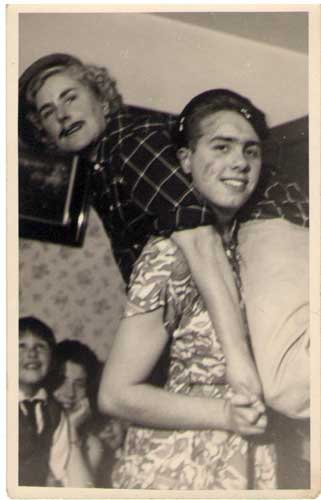 I have a habit of singing, whatever I do I
sing aloud anywhere, especially when I’m working, It’s quite involuntary and
most of the time I am unaware that I am doing it. The practice must have been
passed down to me from my Dad because he was always giving his all to all kinds
of songs. My Mum, true to her Welsh roots, was also in the habit, so it is true
to say we needed no excuse to form a makeshift choir and annoy the neighbours.
We got great pleasure from it.
I have a habit of singing, whatever I do I
sing aloud anywhere, especially when I’m working, It’s quite involuntary and
most of the time I am unaware that I am doing it. The practice must have been
passed down to me from my Dad because he was always giving his all to all kinds
of songs. My Mum, true to her Welsh roots, was also in the habit, so it is true
to say we needed no excuse to form a makeshift choir and annoy the neighbours.
We got great pleasure from it.
One warm summer evening something magical happened that has stayed with me all my life. I often recall it with a good deal of joy.
We lived in old Victorian back to back housing, which meant that the back gardens of both streets formed, what with a bit of imagination, could be described as an open air theatre. The upstairs tenants had small balconies complete with iron railings, these were the gallery, the gardens being the performance area. Because of the lovely weather nearly everyone was sitting in their back yards or on the balconies, we all knew everyone, so conversations were called across the gardens. Someone, I bet it was my Dad started singing, and within a short time the all the neighbours joined in. Some who had not been outside soon appeared and occupants of the flats that overlooked the ‘theatre’ crowded the windows eager to share the intense pleasure of this spontaneous event. Songs old and new were sung with an unusual amount of care, Music Hall songs, ballads and even operatic arias were attempted. Someone called out “Do you know this one” and gave a solo rendition, another beat the time on a saucepan and comments and compliments rang back and forth across the gardens.
This blissful entertainment carried on until dark and not a drop of booze passed anyones lips. If only life could be like this every day!
The Tribe
Dad’s brood of many brothers and sisters when they married never moved far from the Wharf, in fact living within a couple of streets only yards from the river. This resulted in us all being very close, if I came home and no-one was in, I had a choice of other homes to shelter in, no knocking on doors, just walk in and be comfortable. Most people I know have cousins that they see on high days and holidays, not in our family , we just drifted from one house to another without a thought,. often staying the night or for days on end, this resulted in us cousins being more like brothers and sisters. Aunt Rose and Uncle Fred Isaac lived just opposite us and were perhaps more like a second Mum and Dad to me. Cousins Freddie, Doreen and Lenny and later David shared many good times. with me. Aunt Rose was a true lady, gentle and loving and always aware of her duties to her family. She would try to be genteel by attempting to hide her cockney accent, not always successfully, some times talking of ‘Am and Heggs’. I remember her with great affection
Uncle Fred Isaac was a jeweller in Clerkenwell, a little more up in status than all the artisans that made up the rest of the tribe. Never one to show too much affection, he treated me like he treated his own kids buying me the same gifts he bought for them, so I was always aware of his love for me. Uncle Fred smoked roll up cigarettes and he had the uncanny knack of being able to roll the thinnest fags imaginable. He smoked it down to the very end until it struggled for life and died out due to lack of combustible materials, then to my amazement, he would, with his lighter, relight the almost non-existent dog end that was between his lips, without burning his mouth or his rather generous nose. It must have been his skill with his hands that helped him perform this almost impossible task. Now Uncle Fred had a stammer that only seemed to manifest itself on the letter ‘W’. Rather foolishly he was in the habit of using the expression ‘Whusname’. One day as he was in full flow, the dreaded whusname was attempted unsuccessfully and Uncle Fred became stuck on the ‘W’,w-w-w-w-w he stammered until my Dad, frustrated by his attempts, said “for Gawd’s sake Fred, say Fingamebob!” Even Fred laughed!
Very nearby lived Aunt Lil, Aunt Grace, Aunt Flo and round the corner Aunt Ethel, along with their families. None of us were short of affection or family support, no wonder we all look back to those days with misty eyes.
All these aunts had married into local families, families that became part of our wider family, one day I will attempt to count them all. On second thoughts, forget it!
Knees-Ups and Ding-Dongs
As soon as Peace was declared the family started celebrating and carried on the festivities for the next 35 years. No particular reason was needed to carry home a crate or two of beer, wind up the gramophone and Hokey-Cokey the night away. A good night in the The King’s Head would spark the need to ‘finish off’ the night in the nearest house. Unfortunately the nearest house was our house and many a night, when I was young, I would be fast asleep in the front room in my Put-u-up when the door flew open and half the family and a few stragglers reluctant to part company with them poured in full of fun and light ale. I had to struggle to get dressed hurriedly without showing my boyhood to half the members of the local boozing society. Then I would sit in the Kitchen trying to look like I was enjoying being deprived of my beauty sleep ( no wonder I’m so ugly).
Eventually, as I grew up, I began to appreciate these celebrations, especially when they were in someone else’s house. They normally took place every Saturday night, needing the customary warm up in the pub to light the blue touch paper. No preparations were made, drink was bought at turning out time and carried home and larders plundered for something to eat. Living so close to each other had the advantage of three or four kitchens being pillaged in a short space of time, thus giving more time for the serious business of drinking.
On special occasions, birthdays, bank holidays etc. an effort was made to prepare for a proper party with drink ordered beforehand. Men drank light ale or brown ale and women drank Gin and Orange, so it didn’t take genius to plan the bar. A ham on the bone, a chunk of cheese, pickled onions and loaves of bread seemed to be the essentials for the nosh. We would dress in our best clothes and be on our best behaviour until the light ale took effect. My cousin Florrie would bash on the piano as if it had done something to upset her. Most of her tunes seemed the same and when she started each number there was a period of silence until some member of the family who had a leaning towards clairvoyance, twigged on to the particular number and started singing. Then when everyone else joined in, Florrie was left to her own devices, some times finishing at the same time as singers. Nearly everyone was expected to perform a ‘party piece’ resulting in an evening of refinement, well what we considered refinement, with the same people doing the same spot at every party. My Mum would, of course sing ‘When you come home again to Wales’, Uncle Fred Isaac, he of the stammer, would foolishly chose to sing ‘W-w-w-w-where did Robinson Crusoe go with Friday on Saturday Night?’ and me and Aunt Grace performed an acrobatic ‘Apache’ dance. All of these acts were met with derision, but when the eldest sister, Aunt Flo got up to sing, this stately lady got a respectful silence. She had a fine deep voice and knew what to do with it, she always sang 'There’s a little grey home in the West’ with great dignity. Most of her sisters would dab their eyes with their hankies when she sat down. After a short spell of decorum, the hilarity resumed.
This gentle hilarity soon turned into something less gentle, and that’s when the naughty songs were sung. Some were merely cheeky and some even cheekier still, no night was complete without the family anthem ‘Down in the Sewer’. I won’t render unto you the whole song, I’ll leave that to your very fertile imaginations!
In spite of all my stories of constant boozing, the family remained respectable, no-one having drink problems, divorces, trouble with the police or letting down the good name of The Walker Tribe! What a boring lot!
Hannah Walker
Hannah Walker was my grandmother and of course grandmother to all my numerous cousins . Apart from a few basic facts, I never knew much about her, I have a slight memory of seeing her when I was just a baby, she must have been very ill because I was carried into a dark room , the curtains were drawn, and Nan was laid in what seemed to me a dark, deep bed. I found it a bit scary so I suppose I averted my gaze, and that is my only memory. I have been aware of her, but never felt close to her or had any feelings for her, but since gathering information about her from family members and putting together all the stories of her passed down by my dad, I have the greatest of admiration and pride for her. It feels like I have just met a long lost relative, it’s a good feeling!
Hannah was born on 6th August 1877, in Kingsland, in the old Borough of Shoreditch, one of nine children of William Wright, a general dealer. Her mum, Hannah Snr. had a grocer’s shop, her family being traders, stall holders and craftsmen, as a kid I recall a few ‘cousins’ from her side of the family who had market stalls in Hoxton and Ridley Road Markets
She married Granddad, Charles Walker, and had twelve children and at some time moved into Hammonds Cottages on Middlesex Wharf. It seems that granddad Charlie, who was a plumber, never had much work and was content to ‘wait til the work came in’, mostly in the pub. Money was extremely tight or even non-existent, but Hannah’s fortitude and stamina kept her family together and fed, in what now seems to be an heroic manner. I have been brought up with my Dad’s humorous stories of Hannah catching sparrows and making Sparrer Pie, of her going to Chatsworth Road and scrounging the waste from fishmongers and butcher’s shops, hence the family joke of being raised on ‘Cod’s Heads and Bacon Bones’, except now I cannot see the joke any more!
As well as financial troubles, Hannah had the burden of ill health, she contracted Padget’s disease, a bone disorder, that left her with a pronounced limp and impaired her mobility, but this was just another obstacle to overcome for this strong and admirable woman. Hannah took advantage of the fact that they lived on the wharf, then an east end resort, and made toffee, chocolate and coconut icing in her kitchen and sold them from a stall outside the Prince of Wales pub, she raised her status and reputation by becoming the local midwife and ‘layer out’. It was common practice for mature and experienced women to assist their neighbours when a baby was due and to wash and lay out corpses when a death occurred. Such was Hannah’s reputation that local Doctors would trust her to take care of the births and leave her to her own devices, she also won the trust and admiration of the local community. because of her professional attitude to her work. She would always keep a set of white nursing robes washed and starched in readiness for her next call out., giving the expectant mother a sense of her competence and ability.
My dad told me that one dark and stormy night, Hannah was called to an imminent birth, in a cottage in Coppermill Lane, quite a distance for anyone let alone a disabled woman, so dad was roused from his bed to accompany his Mum across the dark and scary Marshes. Dad had to carry Hannah’s heavy bag and hold a storm lantern that blew out in the darkest part of the journey, he was only eight years old and was very frightened, but Hannah kept him calm and when she arrived at the patients home, took command and pacified the worried parents to be. The baby was born and the couple heaped praise upon this extraordinary woman.
When her children grew up and fetched their boyfriends and girlfriends home to the wharf, the overcrowded cottage was even more overcrowded, but Hannah welcomed them all and whenever anyone in the family had a problem, it was Hannah that they turned to.
She died in October 1940, I wish that I had known this inspirational woman. I am very proud of her!
Nanny Isaacs
Perhaps the reason for my being unaware of Hannah was that I had Nanny who lived next door but one to us. We all called her Nanny and I assumed that she was my grandmother and the similarity of her name to Uncle Fred Isaac did nothing to dispel this assumption. Nanny was very old, so we thought, and her tiny flat was a fine example of Victorian chic. Heavy velvet curtains complete with ornate tassels draped the windows and doors, huge draped overmantels decorated the fireplaces and there were even gas lights still in use. Lots of pictures, ornaments and clocks were crowded onto every mantelpiece and shelf and most evocative of all, the whole place smelled of Wintergreen. In the cold weather she smothered her chest with Goose Fat in the belief that if it made the goose waterproof it would do the same for her. I can still smell this distinct aroma whenever I think of her.
She was a tough old bird who was brought up in Hoxton and would tell of the time when if a neighbour was ill or incapable of taking care of them selves, the rest of the neighbours would go to the market and ‘hoist’ food by stuffing it in their pinafores and supplying it to the unfortunate one.
As a young woman she worked in the famous Britannia Music Hall in Hoxton, as a barmaid and met most of the big stars including the great Marie Lloyd.
My mum, in her usual caring way, kept an eye on her in her more vulnerable years, taking dinners in to her most days, and it was my job every day to go into see if she needed anything before I went to school, but I sometimes felt that her pride stopped her from asking for too much help.
She came from a culture that was tough, her broken nose illustrated that, so she never showed much emotion or made a fuss, but when I was called up into the army and went to say goodbye to her, she uncharacteristically kissed me and told me to look after myself and I’m sure that I spotted a bit of moisture in her eye.
As I said, I thought that she was my nan because we called her Nanny, but it seems that I had ignored the fact that all the other kids in the area also knew her as Nanny Isaacs!
| brian@tales-of-the-old-east-end.co.uk |
| Website by LAURENCE PAYNE |
| . |
